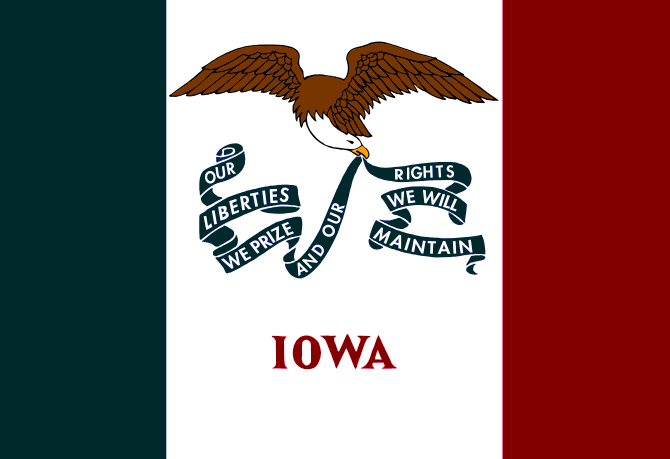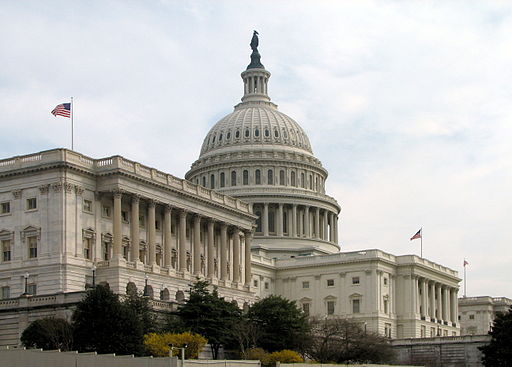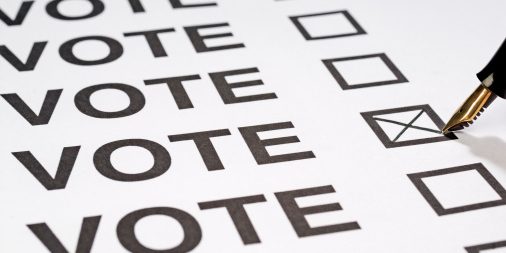Tag: iowa
-
Iowa Gov. Reynolds signs bill banning RCV

On June 2, 2025, Gov. Kim Reynolds (R) signed HF 954, making Iowa the sixth state to ban ranked-choice voting (RCV) this year. The new law says: “An election in this state shall not be conducted using ranked choice voting or instant runoff voting.” The bill also makes other changes to election laws in the…
-
Iowa General Assembly adjourns the first year of the two-year legislative session, addresses two potential constitutional amendments

The Iowa General Assembly adjourned on May 1, ending the first year of the two-year legislative session. During this legislative session, legislators addressed two constitutional amendments that may be placed on the ballot for voters to decide in 2026 and 2028. Senate Joint Resolution 11 (2025) First, the Iowa State Senate passed Senate Joint Resolution…
-
District judge blocks Iowa law requiring school districts to remove books depicting sex acts

What’s the story? On March 25, U.S. District Judge Stephen Locher blocked a portion of Iowa state law requiring school districts to remove all books from public school libraries that contain descriptions of sex acts, as defined by the law. Locher ruled that the law — Senate File (SF) 496 passed in 2023 — was…
-
Democrats gain a seat in the Iowa Senate

On Jan. 28, Mike Zimmer (D) defeated Katie Whittington (R) in the special election for Iowa Senate District 35, 51.7% to 48.1%. The seat became vacant in November 2024 after Gov. Kim Reynolds (R) appointed Sen. Chris Cournoyer (R) to serve as lieutenant governor. The last time that the seat was up for election in…
-
84% of elections in Iowa are uncontested
Of 1,727 regular elections in Iowa—1,444 (84%) are uncontested. An uncontested election is one where the number of candidates on the ballot is less than or equal to the number of seats up for election. Of the 24 states where Ballotpedia is covering every election on Nov. 5, Iowa has the highest rate of uncontested…
-
Seven presidential tickets will appear on the ballot in Iowa this November

Iowa’s Nov. 5, 2024, general election ballot will feature seven presidential candidates and their running mates. They are: Robert F. Kennedy Jr., running as an independent, withdrew from the presidential election in August, but will still appear on Iowa’s ballot as a We the People candidate. This is the fewest candidates on Iowa’s presidential ballot…
-
Incumbent Zach Nunn (R) and Lanon Baccam (D) are running in the general election in Iowa’s 3rd Congressional District

Incumbent Zach Nunn (R) and Lanon Baccam (D) are running in the general election in Iowa’s 3rd Congressional District on Nov. 5, 2024. Nunn defeated then-incumbent Cindy Axne (D) in 2022 50.3% to 48.9%. As of the Q2 2024 campaign finance reports, Nunn had raised $3.96 million and Baccam had raised $2.71 million. The Democratic…
-
Nine states approved bills related to noncitizen voting, voters in eight states will consider ballot measures this November

Nine states, including seven with Republican trifectas, have enacted legislation this year related to the eligibility of noncitizens to vote. In total, voters in eight states will consider ballot measures related to noncitizen voting at the November general election. In Louisiana, SB 436 requires proof of citizenship for voter registration applications. In 2022, Louisiana voters approved a ballot…
-
Two U.S. House incumbents are in contested primaries in Iowa this year—tying with 2016 for the most this decade

This year’s filing deadline for candidates running for Congress in Iowa was March 15, 2024. Eleven candidates are running for Iowa’s four U.S. House districts, including five Democrats and six Republicans. That’s 2.75 candidates per district, higher than the 2.5 candidates per district in 2022 but lower than the 4.5 candidates per district in 2020.…
-
Fewer Iowa legislators retiring this year than 2022

There are 125 state legislative seats up for election this year in Iowa. Sixteen incumbents (three in the Senate and 13 in the House) did not file to run for re-election. From 2010 to 2022, the average number of retirements per cycle was 22. In 2022, 40 incumbents (11 in the Senate and 29 in…

